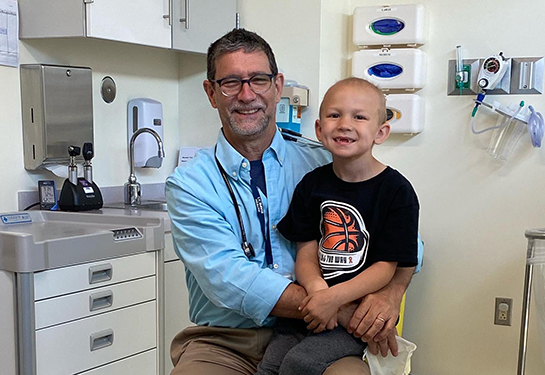What families need to know about the signs and symptoms of eating disorders
Q&A with UC Davis adolescent medicine physician Laura Kester Prakash
As an adolescent medicine physician at UC Davis Children's Hospital, Laura Kester Prakash diagnoses and treats children and adolescents with eating disorders. She assesses their physical, psychological and nutritional state to provide them with the resources and support needed to ensure a successful recovery.
Prakash uses a patient-centered, developmentally based approach in her treatment of eating disorders. She identifies risk factors that make patients more susceptible to eating disorders, as well as characteristics associated with a lower likelihood of negative outcomes to empower patients in their recovery.
We asked Prakash for her advice for families who suspect that their teen has an eating disorder.
Q: What is an eating disorder?
A: Eating disorders are serious, life-threatening conditions that, if not properly treated, can result in significant short- and long-term complications. They cross over the genetic, physical, mental and psychosocial realms of health.
Common eating disorders include anorexia nervosa, bulimia nervosa, and binge-eating disorder.
Eating disorders can often be hard for parents to recognize because many teens can have unusual eating patterns. Parents should look for abnormal eating habits, including:
- missed or skipped meals
- excessive eating, whether consistently or intermittently
- becoming sick after eating
- significant exclusion of types of food or food groups
The diagnosis of an eating disorder is based on identifying an energy imbalance. When the energy needed for a person’s developmental stage and physical activity exceeds the amount consumed, the person experiences energy deficiency.
However, eating disorders can involve more than nutrition. They can also include excessive exercising and inappropriate usage of medications that can influence a person’s metabolism. Over time, if these eating disorders persist, they can result in substantial harm to the physical, physiological and social health and functioning of a young person.
Q: What are the signs and symptoms of an eating disorder?
A: Eating disorders exist on a spectrum. This means that a person with one type of eating disorder behavior can evolve or change to other types of eating disorder behaviors over time. Signs and symptoms of an eating disorder include:
- Introduction of strict “healthier” dietary changes with the intention of weight loss (these can be transitions to vegetarian, vegan, or low-fat diets that ultimately result in a substantial decrease in overall nutritional intake)
- Excessive scrutiny of ingredient labels
- Initiation of precise calorie counting
- Weighing oneself multiple times a day
- Eating smaller portions or taking a long time to eat (these behaviors may start in unobserved places like school before they progress to occurring at home or with family meals)
- Secretive eating behaviors
- Avoiding eating with family or friends
- Hiding food during social meals
- Excessive exercise
- Multiple trips to the bathroom after meals
- Change in dressing patterns or wearing multiple layers of clothing
Q: How common is this?
A: Historically, it has been thought that approximately 10 percent of the general population suffers from some type of eating disorder over their lifetime. However, alongside the pandemic, hospitals across the country have seen a substantial uptick in the number of patients presenting with eating disorders.
In addition, we have seen patients with eating disorder behaviors who have been as young as 12. Unfortunately, only a small number of patients with eating disorders will ever be identified or seek treatment. Untreated children and adolescents with eating disorders can become adults with chronic and disabling eating-related medical problems that can be life-threatening.
Q: What are the risk factors for an eating disorder?
A: Risk factors for eating disorders can exist within an individual or an individual’s family. These include:
- Females are at a higher risk than males to get eating disorders
- Teens and early adults (15-19 years old) have the highest peak age of onset for eating disorders, although some studies show a much younger peak age in onset
- Having a family history of an eating disorder
- Having a history of other mental health concerns like anxiety and obsessive-compulsive disorder
- Having a history of the patient or family dieting or concerned about weight
- Transitions such as changing schools or moving house
- Participation in elite or individual sports. Team sports tend to be protective
- Perfectionist mentality
- Struggling with coping skills (better developed coping skills can be protective)
- Being different from your peers, particularly early maturation
- Using food-tracking apps that place a large focus on calorie counting
Having supportive and close relationships can help prevent eating disorders. However, having overprotective relationships, neglect, family conflict or significant discussions around weight or shape can also be risk factors.
Q: What should parents do if they suspect their child has an eating disorder?
A: If you are concerned that your child has an eating disorder, talk with them in a non-judgmental and supportive way. Avoid specific questions that introduce ideas or ways to have an eating disorder. Questions that you can ask include:
- How do you feel about your weight, body shape or body size?
- Does your weight affect the way you feel about yourself?
- Are you worried that you are overweight or in danger of becoming overweight?
- Are you doing anything to try to change it?
Eating disorders are best addressed, diagnosed and treated by medical professionals with experience in these conditions. If you have a concern or suspicion that your child has an eating disorder, bring your child to their primary care provider to be evaluated. Specialist doctors can also provide additional evaluation and medical treatment and support.
The UC Davis Adolescent and Young Adult Clinic for Eating Disorders and Nutritional Imbalances evaluates, diagnoses and treats children and adolescents suffering from an eating disorder. The team works to ensure that patients and their families have the tools they need for a successful recovery.



